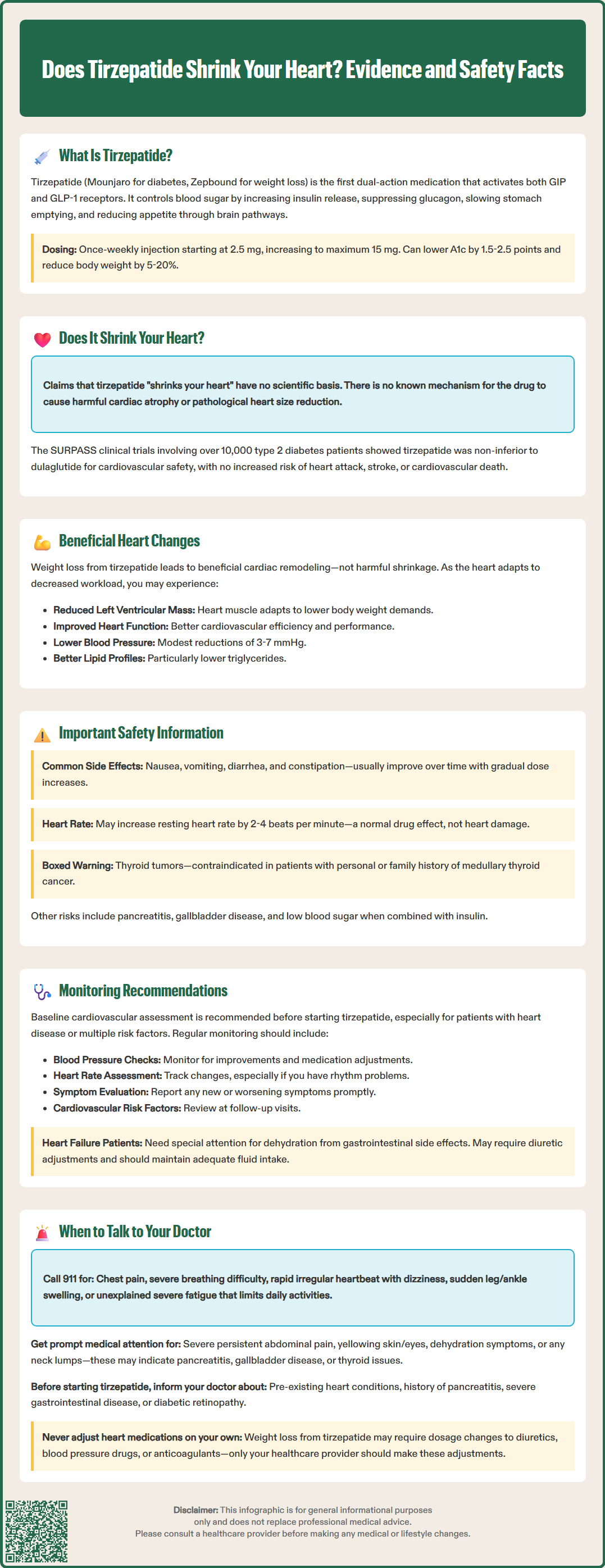LOSE WEIGHT WITH MEDICAL SUPPORT — BUILT FOR MEN
- Your personalised programme is built around medical care, not willpower.
- No generic diets. No guesswork.
- Just science-backed results and expert support.
Find out if you’re eligible

Concerns about whether tirzepatide shrinks the heart have emerged among patients considering this medication for type 2 diabetes or weight management. However, current clinical evidence does not support this claim. Tirzepatide, a dual GIP and GLP-1 receptor agonist approved by the FDA, has demonstrated cardiovascular safety in large clinical trials without evidence of pathological cardiac atrophy. While weight loss medications naturally raise questions about effects on vital organs, research indicates tirzepatide may offer cardiovascular benefits rather than harmful structural changes. Understanding the actual cardiac effects of this medication helps patients and clinicians make informed treatment decisions based on scientific evidence rather than misconceptions.
Quick Answer: Tirzepatide does not shrink the heart; current clinical evidence shows no mechanism for cardiac atrophy and suggests potential cardiovascular benefits instead.
Tirzepatide is a prescription medication approved by the FDA for the treatment of type 2 diabetes mellitus (marketed as Mounjaro) and chronic weight management in adults with obesity or overweight with weight-related comorbidities (marketed as Zepbound). It belongs to a novel class of medications that activates both glucose-dependent insulinotropic polypeptide (GIP) and glucagon-like peptide-1 (GLP-1) receptors, making it the first dual incretin receptor agonist available in clinical practice.
While the exact mechanisms by which tirzepatide exerts its effects are not fully understood, it is believed to work through multiple complementary pathways to improve glycemic control and promote weight loss. By activating GIP receptors, tirzepatide may enhance insulin secretion in a glucose-dependent manner, meaning it stimulates insulin release primarily when blood glucose levels are elevated, potentially reducing the risk of hypoglycemia. Simultaneously, GLP-1 receptor activation may suppress glucagon secretion, slow gastric emptying, and reduce appetite through central nervous system pathways that regulate satiety.
Tirzepatide is administered as a once-weekly subcutaneous injection, with dosing typically initiated at 2.5 mg and gradually titrated upward based on therapeutic response and tolerability. The maximum approved dose is 15 mg weekly. Clinical trials have demonstrated substantial reductions in hemoglobin A1c levels (often 1.5-2.5 percentage points, depending on dose) and significant weight loss (approximately 5-20% of baseline body weight, with higher percentages generally seen in non-diabetic populations with obesity).
Common adverse effects include gastrointestinal symptoms such as nausea, vomiting, diarrhea, and constipation, which typically diminish with continued use and gradual dose escalation. Important safety considerations include a boxed warning for thyroid C-cell tumors (contraindicated in patients with personal/family history of medullary thyroid carcinoma or Multiple Endocrine Neoplasia syndrome type 2), risk of pancreatitis, gallbladder disease, and diabetic retinopathy complications. When used with insulin or insulin secretagogues, tirzepatide may increase hypoglycemia risk, requiring dose adjustments of these medications.

Concerns about whether tirzepatide "shrinks your heart" lack scientific foundation based on current clinical evidence. There is no established mechanism by which tirzepatide would cause cardiac atrophy or pathological reduction in heart size. Available research suggests potential cardiovascular benefits rather than harmful structural changes to the heart.
The SURPASS clinical trial program, which evaluated tirzepatide in over 10,000 patients with type 2 diabetes, included cardiovascular safety assessments. The SURPASS-CVOT (Cardiovascular Outcomes Trial) was designed specifically to assess major adverse cardiovascular events, comparing tirzepatide to dulaglutide (not placebo). Preliminary data suggest tirzepatide was non-inferior to dulaglutide for the primary composite endpoint of cardiovascular death, non-fatal myocardial infarction, and non-fatal stroke.
While comprehensive imaging studies specifically examining cardiac structure with tirzepatide are limited, weight loss achieved through various interventions has been associated with beneficial cardiac adaptations. In patients with obesity, weight reduction often leads to improvements in left ventricular mass and diastolic function. These changes represent beneficial reverse remodeling rather than pathological shrinkage, as the heart adapts to reduced cardiovascular workload.
Tirzepatide has demonstrated effects on several cardiovascular risk factors. Clinical trials have shown modest reductions in systolic blood pressure (typically 3-7 mmHg, depending on dose and baseline values) and improvements in lipid parameters, particularly triglycerides. These metabolic improvements may contribute to overall cardiovascular health rather than causing cardiac damage.
It is important to distinguish between pathological cardiac atrophy and beneficial cardiac remodeling that occurs with weight loss and improved metabolic health. The latter represents a positive adaptation to reduced cardiovascular workload, while there is no evidence that tirzepatide causes the former.
While tirzepatide does not shrink the heart, patients should be aware of important cardiovascular considerations when initiating and continuing therapy. Understanding both the benefits and potential risks allows for informed decision-making and appropriate monitoring.
Cardiovascular Benefits: Patients with type 2 diabetes and obesity face substantially elevated cardiovascular risk. Tirzepatide addresses multiple cardiovascular risk factors simultaneously through weight reduction, improved glycemic control, blood pressure lowering, and favorable effects on lipid metabolism. The magnitude of weight loss achieved with tirzepatide often exceeds that seen with lifestyle modification alone, potentially contributing to improvements in cardiovascular health.
Heart Rate Considerations: Like other GLP-1 receptor agonists, tirzepatide may cause a modest increase in resting heart rate, typically 2-4 beats per minute on average. This effect appears to be dose-related, though the exact mechanism remains unclear. While generally well-tolerated, patients with pre-existing tachyarrhythmias should be monitored appropriately. This increase does not indicate cardiac damage but rather represents a pharmacological effect that should be distinguished from pathological tachycardia.
Monitoring Recommendations: Patients initiating tirzepatide should undergo baseline cardiovascular assessment, particularly those with established cardiovascular disease or multiple risk factors. Regular monitoring should include:
Blood pressure measurements at follow-up visits
Assessment of heart rate and rhythm
Evaluation for symptoms of cardiovascular decompensation
Periodic review of cardiovascular risk factors and comorbidities
Patients with heart failure require special consideration. While weight loss generally benefits heart failure patients, dehydration from gastrointestinal side effects may require adjustment of diuretic therapy. Patients should be monitored for signs of dehydration, especially during dose titration, and should maintain adequate fluid intake unless otherwise directed by their healthcare provider.
Open communication with your healthcare provider is essential for safe and effective tirzepatide therapy. Certain symptoms, medical history factors, and clinical scenarios warrant prompt medical evaluation and discussion.
Seek immediate medical attention (call 911 for severe symptoms) if you experience:
Chest pain, pressure, or discomfort, particularly if new or worsening
Severe shortness of breath or difficulty breathing at rest
Rapid or irregular heartbeat accompanied by dizziness or lightheadedness
Swelling in the legs, ankles, or abdomen that develops suddenly or worsens
Unexplained fatigue or exercise intolerance that significantly limits daily activities
These symptoms may indicate cardiovascular complications unrelated to tirzepatide itself but requiring urgent evaluation, especially in patients with diabetes and obesity who have elevated baseline cardiovascular risk.
Also seek prompt medical attention for:
Severe, persistent abdominal pain (which may indicate pancreatitis)
Yellowing of skin/eyes or right upper abdominal pain (possible gallbladder disease)
Symptoms of dehydration (dizziness, dry mouth, decreased urination)
Any neck lump or hoarseness (relevant to thyroid tumor risk warning)
Schedule a routine appointment to discuss:
Pre-existing cardiovascular conditions including coronary artery disease, heart failure, arrhythmias, or valvular heart disease should be disclosed before starting tirzepatide. Your physician can assess whether the medication is appropriate and establish an individualized monitoring plan. Patients with a history of pancreatitis, severe gastrointestinal disease, or diabetic retinopathy should also discuss these conditions, as they may influence treatment decisions.
If you are taking medications for heart conditions, particularly diuretics, antihypertensives, or anticoagulants, dosage adjustments may be necessary as weight loss and metabolic improvements occur. Never adjust or discontinue these medications without consulting your healthcare provider. Blood pressure reductions achieved with tirzepatide may necessitate reducing some antihypertensive medications to prevent hypotension.
Questions to ask your healthcare provider:
Inquire about your baseline cardiovascular risk and how tirzepatide fits into your overall treatment strategy. Discuss realistic expectations for weight loss and metabolic improvement, as well as the timeline for cardiovascular benefits. Ask about warning signs that should prompt contact with the medical team and clarify the monitoring schedule appropriate for your individual circumstances. Understanding the evidence-based benefits and the absence of cardiac shrinkage concerns can provide reassurance while ensuring appropriate vigilance for genuine cardiovascular issues.
No, tirzepatide does not cause pathological cardiac shrinkage. Clinical trials involving over 10,000 patients have shown no evidence of harmful structural changes to the heart, and weight loss achieved with tirzepatide may actually lead to beneficial cardiac remodeling.
Tirzepatide has demonstrated cardiovascular safety with potential benefits including modest blood pressure reductions (3-7 mmHg), improved lipid parameters, and a small increase in resting heart rate (2-4 bpm). The SURPASS-CVOT trial showed non-inferiority to dulaglutide for major cardiovascular events.
Tirzepatide has demonstrated cardiovascular safety in clinical trials, but patients should report symptoms like chest pain, severe shortness of breath, or rapid irregular heartbeat immediately. Regular monitoring of blood pressure, heart rate, and cardiovascular risk factors is recommended, especially for those with pre-existing heart conditions.
All medical content on this blog is created using reputable, evidence-based sources and is regularly reviewed for accuracy and relevance. While we strive to keep our content current with the latest research and clinical guidelines, it is intended for general informational purposes only.
This content is not a substitute for professional medical advice, diagnosis, or treatment. Always consult a licensed healthcare provider with any medical questions or concerns. Use of this information is at your own risk, and we are not liable for any outcomes resulting from its use.